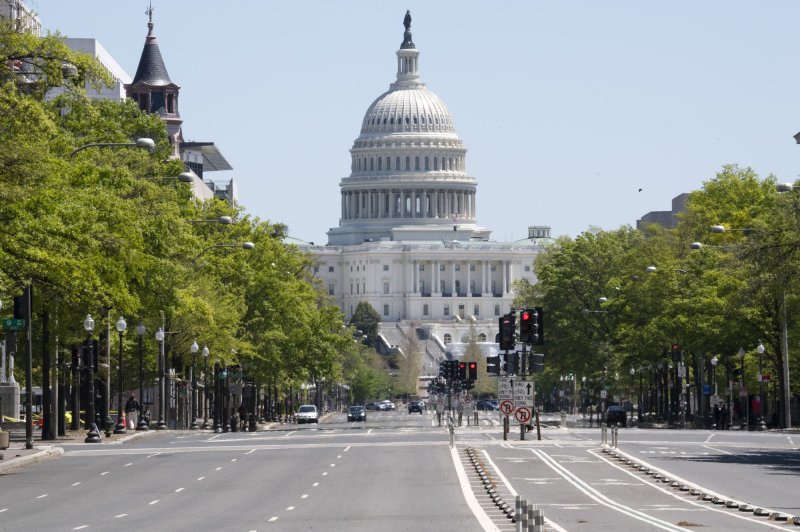
Pennsylvania Avenue that runs between the White House and the U.S. Capitol is virtually empty of traffic on April 22, in Washington, D.C. Two measures passed by Congress to help Americans facing hardship are set to expire Friday, unless they're extended by lawmakers. File Photo by Pat Benic/UPI | License Photo
July 24 (UPI) -- A pair of federal measures that were enacted in the spring to help Americans with financial hardships brought on by the COVID-19 pandemic are set to expire on Friday.
Congress faces a deadline to extend enhanced federal unemployment benefits, which have given many unemployed an additional $600 per week. The other provision set to expire Friday is a national moratorium that bars landlords from evicting millions of renters in public and federally subsidized housing.
The $600 per week payment was included in March's CARES Act after lawmakers decided state unemployment systems would not be able to process sufficient payouts for the full amount of workers' lost wages.
Congress, which can extend the benefits, is still negotiating a relief bill but lawmakers in the House and Senate remain far apart on a consensus aid package.
Treasury Secretary Steven Mnuchin said Thursday that the Republican plan will be "based on approximately 70% wage replacement." Under the GOP plan, the weekly payment would likely decrease to about $200 or $300.
House Speaker Nancy Pelosi said the present incarnation of the GOP bill would fail in the lower chamber.
"If we're going to ratchet that down, it ought to be over time," she said.
Congress, which can extend the benefits, is still negotiating a relief bill but lawmakers in the House and Senate remain far apart on a consensus aid package.
Treasury Secretary Steven Mnuchin said Thursday that the Republican plan will be "based on approximately 70% wage replacement." Under the GOP plan, the weekly payment would likely decrease to about $200 or $300.
House Speaker Nancy Pelosi said the present incarnation of the GOP bill would fail in the lower chamber.
"If we're going to ratchet that down, it ought to be over time," she said.
RELATED Two-thirds in U.S. have underlying conditions, at risk for severe COVID-19
Pelosi added that she plans to arrive at the bargaining table with "a commitment to the $600."
The Urban Institute estimates that 12.3 million U.S. households, or 30% of renters nationwide, face possible eviction if Congress doesn't extend the eviction moratorium and state-level policies expire.
The moratorium protects renters in federal housing and those who live in homes with federally backed mortgages. Once the measure expires, landlords will be able to issue 30-day notices to vacate and begin filing eviction paperwork by late August.
RELATED U.S. surpasses 4M coronavirus cases since start of pandemic
The House has already passed legislation to create a $100 billion rental assistance fund and Sen. Kamala Harris, D-Calif., introduced a housing plan that would bar evictions and foreclosures for a year. It would also give tenants as many as 18 months to make up missed payments.
The Republican plan in the Senate contains no provisions to support either plan.
No comments:
Post a Comment